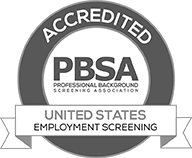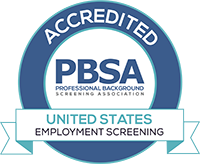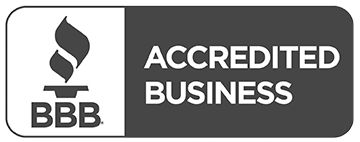BLOG
Important Reminder: Employment Laws Still Apply
July 14, 2020
Businesses are adapting to massive changes ... but employers must continue to comply with laws that cover the hiring and background screening process.
Don’t Get Lax With Laws
We’ve heard from various colleagues and peers in the screening industry: many organizations think federal and state employment laws do not apply during the pandemic. That is incorrect. These laws are active, essential and they will be enforced.
First, every business must have a permissible purpose to run background checks. Federal law stipulates they can be run for employment considerations such as making decisions regarding hiring or promotions.
If your business has a permissible purpose and intends to run employment-related background checks, this might be a good time to read through in-house policies and ensure you’re compliant with applicable laws.
The FCRA
The Fair Credit Reporting Act (FCRA) is a federal law that protects consumers. It established rules for organizations to follow when screening candidates or employees.
Employers must:
• Provide a standalone disclosure. This document informs the recipient you wish to run a background investigation on them. It needs to be clear, concise and have no additional verbiage. Numerous businesses get into trouble over this simple law. Make sure the disclosure you provide is direct, easy to understand and devoid of unnecessary content.
• Obtain authorization. You may not run a background check until the candidate provides consent.
• Follow the adverse action process. If something on a background check causes you to contemplate an adverse action, you are required to follow some specific steps. Learn more.
Second Chance Laws
Multiple states have Ban the Box and related Second Chance Laws. Depending on where you operate, you may need to comply with one or more of them.
Ban the Box laws typically include items such as:
• Employers may not ask about arrests or criminal records on job applications.
• Background checks should be run, but only after an applicant receives an interview or conditional job offer.
• If a background report contains a criminal record, then an individual assessment should be conducted to determine if it warrants further action.
Only Review Reportable Records
It is imperative for employers to make decisions based on current, accurate information. They cannot consider outdated or sealed records. Several states are implementing laws which decriminalize certain offenses or allow residents to expunge low-level convictions. When a criminal record is sealed or expunged, it is no longer publicly available. Such records cannot be reviewed by employers.
To help ensure you only see reportable records, work with a Consumer Reporting Agency (CRA) that is accredited by the PBSA (Professional Background Screening Association – formerly the NAPBS). CRAs, like Backgrounds Online, go to county courthouses and other sources directly to ensure the consumer reports they provide are up-to-date and can be used to make business-related decisions.
Running Background Checks
Safety is a foremost concern as we all resume business during the pandemic. A critical component is to run comprehensive background checks on applicants, volunteers and contractors. These reports help hiring managers determine if a person is qualified for a position or might present an undue risk.
When you’re ready to run background checks that help you maintain safe workplaces and build strong teams; please contact us. We are working remotely and available to assist you Monday through Friday from 7am to 6pm PT.











